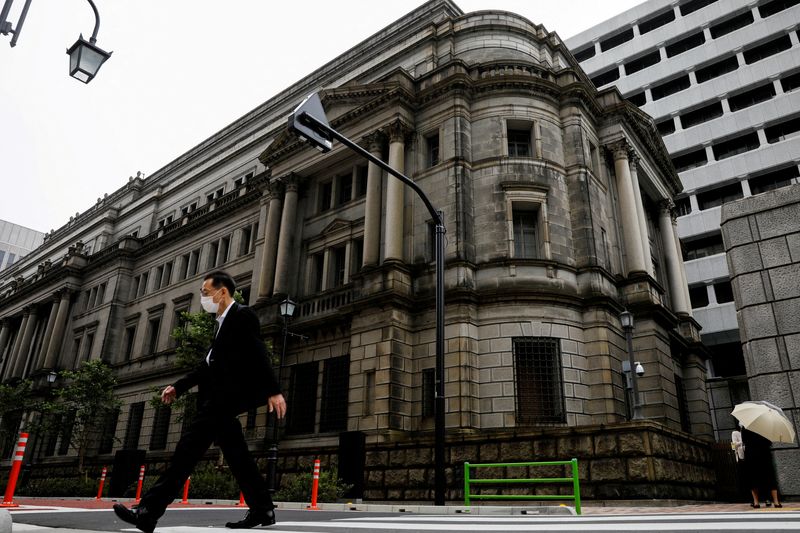By Leika Kihara
TOKYO (Reuters) -Struggling to swim against the tide taking interest rates higher globally, the Bank of Japan staunchly defended its 0.25% yield cap on Monday by offering to buy an unlimited amount of government bonds for the first four days of this week.
The BOJ's defence of its ultra-loose policy pushed the yen to a six-year low of 124 to the dollar on Monday, adding to the problems Japan's economy is facing from already surging costs for fuel and raw material imports.
Under pressure from a steady rise in yields, the BOJ launched its defence by making two offers in a single day to purchase 10-year Japanese government bond (JGB) in unlimited amounts at 0.25%.
The central bank then said it would make the same unlimited offer for the next three days, to make sure investors received the message loud and clear, but some economists believed the central bank's grip on yield curve control was at risk of slipping.
"The power of the BOJ's unlimited bond-buy offer is clearly waning," said Takahide Kiuchi, a former central bank board member who is now an economist at Nomura Research Institute.
"Markets may more forcefully test the BOJ's resolve to defend the 0.25% ceiling, which may prompt the bank to modify its approach and allow the 10-year yield to rise more."
The BOJ's first offer for unlimited bond buying in the morning failed to prevent the 10-year JGB yield from hitting a six-year high of 0.250% on Monday - the level the bank has set as an implicit cap around its yield target.
The central bank made a second offer in the afternoon to buy unlimited amounts of JGBs with maturities of more than five years and up to 10 years.
While the first offer drew no bids, the BOJ accepted bids to buy 64.5 billion yen ($524 million) in JGBs in the second offer.
The two offers, which were the first since Feb. 10, underscored the BOJ's resolve to keep rates ultra-low in contrast to the Federal Reserve's aggressive rate hike plans.
The BOJ then announced a plan to buy unlimited amounts of 10-year JGBs at 0.25% for three consecutive days from Tuesday, deploying the most powerful weapon in its armory to defend its yield target.
"Markets are putting the BOJ to test, so the central bank has no choice but to keep offering unlimited bond buying," said Takafumi Yamawaki, head of Japan fixed income research at JPMorgan (NYSE:JPM) Securities.
"If yields are allowed to move above 0.25%, investors will think the BOJ has tolerated a rise above that level. That makes it harder for the BOJ to carry on with yield curve control."
Under yield curve control (YCC), the BOJ pledges to guide the 10-year JGB yield around 0% as part of efforts to stimulate the economy by keeping borrowing costs low.
The BOJ's current guidance is that it will allow the 10-year yield to move flexibly around its 0% target as long as it stays below the 0.25% upper limit, though it will take into account not just the level but the speed of any rise in yields.
BOJ Governor Haruhiko Kuroda has repeatedly said the central bank would maintain interest rates at the current ultra-low levels, given the fragile economic recovery and as inflation remains well below its 2% target.
Growing complaints from politicians over the weak yen, which is inflating Japan's already rising import costs, may complicate the BOJ's efforts to keep yields ultra-low, analysts say.
The dollar has rallied over 7% against the yen so far in March, its biggest monthly gain in over five years.
The BOJ is caught in a dilemma. By capping rates at zero, it is fueling yen declines that may hurt the economy by pushing up the costs for households and companies.
"Making offers for unlimited bond buying too frequently may cast doubt over the feasibility of yield curve control," said Shotaro Kugo, an economist at Daiwa Institute of Research.

"It may also draw unwanted public attention over the weak yen, so the BOJ probably wants to avoid stepping in too often."
($1 = 123.1200 yen)